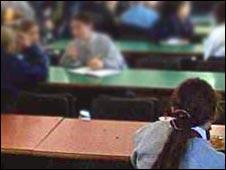Outcry over plans not to extend free school meals
- Published

The Treasury had said 500,000 of children would have benefited
Campaigners against child poverty have attacked plans not to extend free school meals provision in England.
Ministers are shelving a scheme devised under Labour to widen entitlement to free meals to more low income families.
The scheme, due to start this September, could have given free meals to 500,000 more families.
Plans to expand a pilot scheme where all primary children are given free lunches from three areas have also been dropped.
Pilot schemes are running in Durham, Wolverhampton and the London borough of Newham.
The projects were due to be extended this September to five other areas- Bradford, Islington in London, Nottingham, Cumbria and Medway in Kent.
Education Secretary Michael Gove has said the existing pilot schemes would continue, "so as to assess better the case for increasing eligibility in the future".
Labour had under-estimated how much the extension to the pilot would cost over three years, he said, by nearly £200m.
It was in December's pre-budget report that the Labour government announced it would change the system to give free school meals to more people on low incomes.
It would have affected families with a household income below £16,190.
Children whose parents are on income support or jobseekers' allowance will continue to be eligible for the free meals.
Work incentive
Imran Hussain from the Child Poverty Action Group said: "Suspending this support is the same as an income-tax hike of £600 a year for a working poor family with two children.
"It is completely at odds with the coalition' s commitment to end child poverty by 2020.
"Most families living below the poverty line have jobs and this measure would have helped guarantee work makes them better off.
"It would have been a very valuable work incentive for those on benefits seeking jobs. This decision must be urgently reviewed and securing the funds to reinstate the extension must be a top priority in the spending review."
In a letter to the previous Education Secretary, Ed Balls, Mr Gove said Labour had under-estimated the cost of the plans to extend free school meals.
The government is committed - as the last administration was - to ending child poverty by 2020.
In England, about 3 million children are living in poverty. In the 2009 school census in England, 656,500 children in nursery and primary education qualified for free meals.
Health
The Mayor of Newham, where a free school meals pilot began last September, says the scrapping of plans to extend the scheme to other areas is "short-sighted".
He said the primary schools pilot had made a "huge difference" to the lives of pupils and their families.
The council has pledged to continue funding the scheme once the pilot ends next year.
In the borough, one of the most deprived in England, 50% of children are entitled to free school meals under the national system.
This academic year, nearly four in five primary children has taken free school lunches.
The mayor, Sir Robin Wales, urged the government to re-consider: "Our pilot means we can make a huge difference to the lives of our pupils and our families, particularly those working hard but struggling to pay basic bills and get some of the most deprived young people in the country healthy.
"This is a great way of both putting money in their pockets and of improving children's health and fitness."